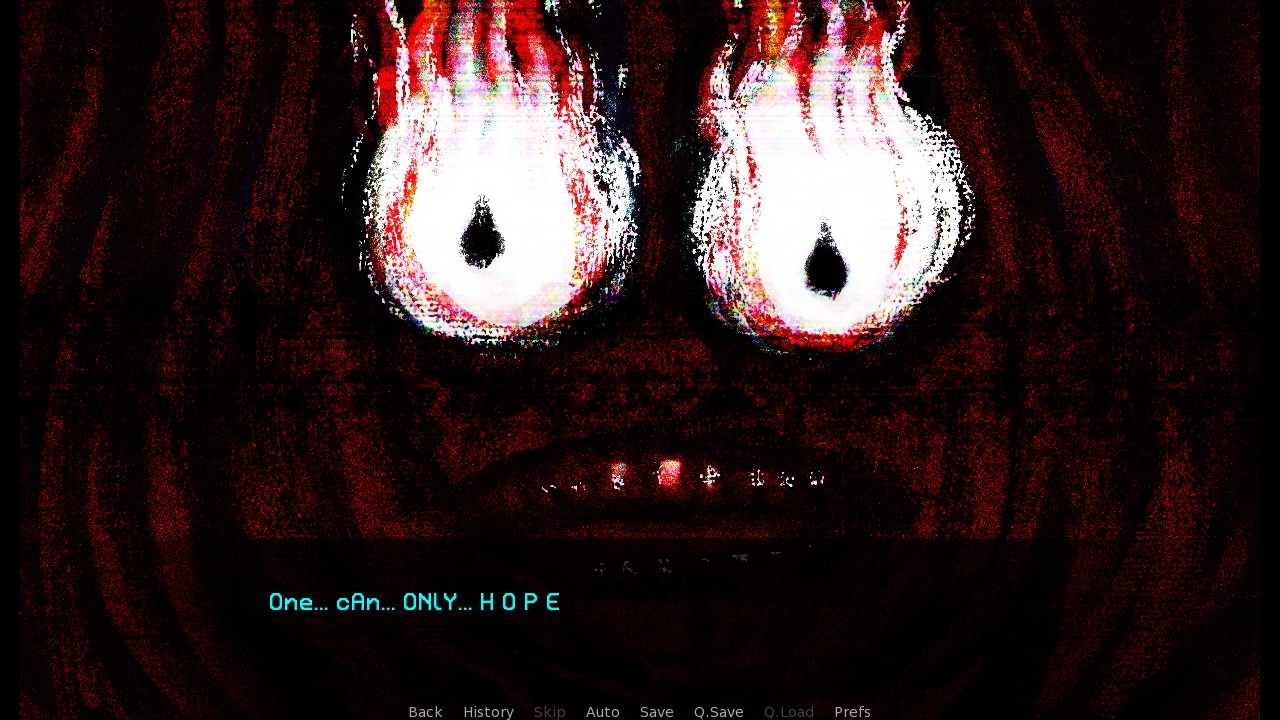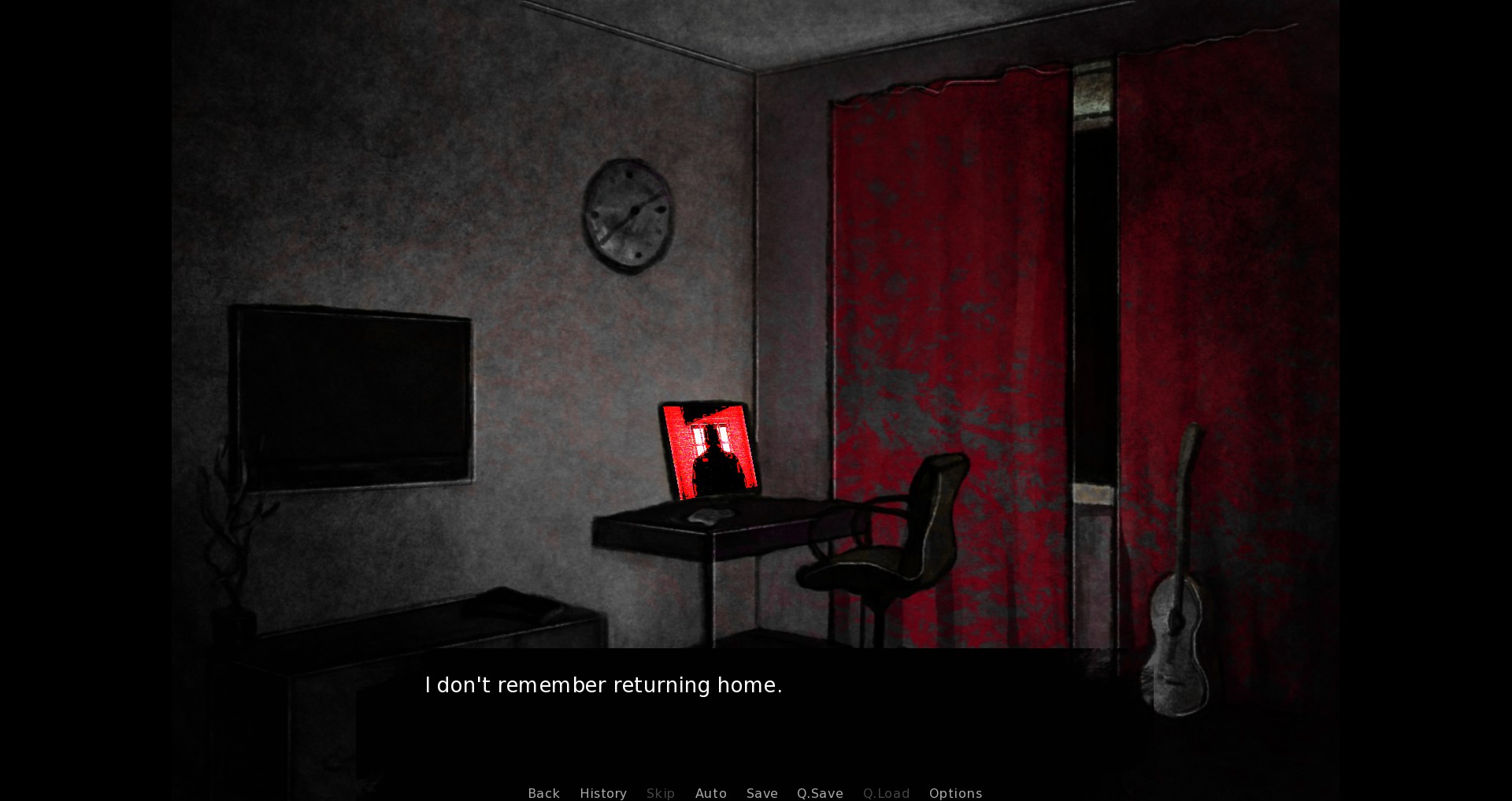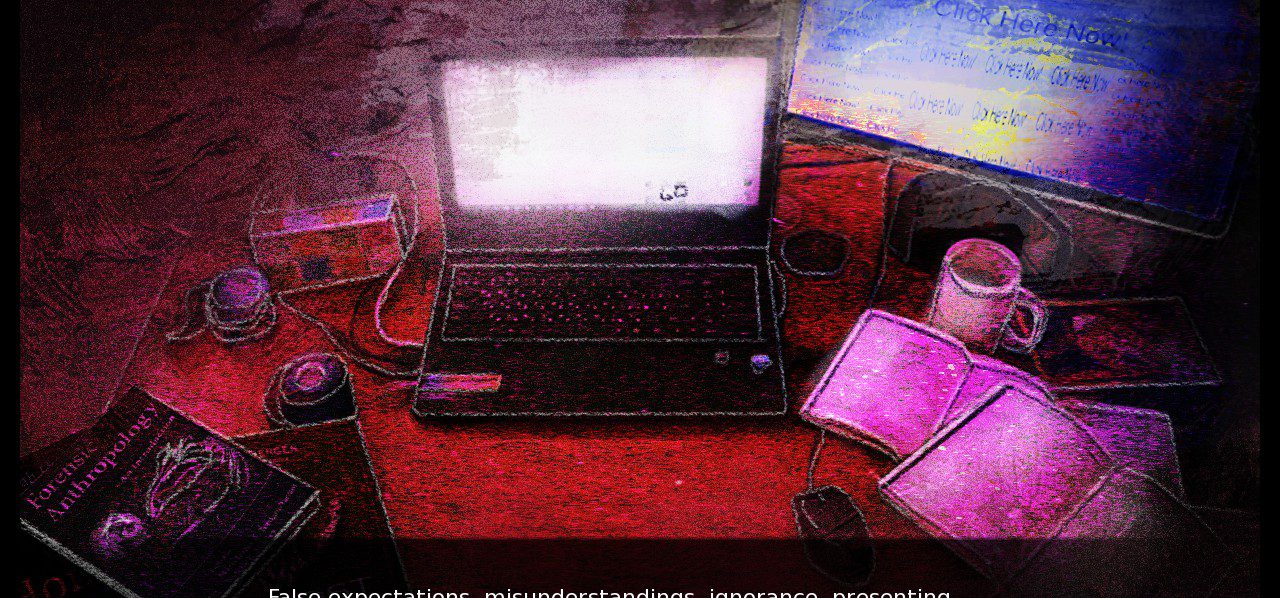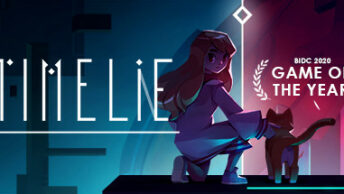Introduction: About the Authors
My name is Anna, you know me as a staff writer who regularly contributes horror game reviews, articles, and interview contributions to SaveorQuit.com
My name is Ethan. I am an ethereal construct which was formed in a realm beyond this plane of reality. These days I spend my time analyzing anything in the world I can get my hands on. This world doesn’t have to be scary, but it can be.
My name is Aleksey Melikhov, a.k.a. Time Loop, a translator, editor, lecturer and freelance writer. And also a bit of a gamedev, but sadly, I don’t have that much time for it. I think I need to reorganize stuff for a bit.
Impact of Internet Culture
1. Has the Internet changed our conception of ‘self’? Why or why not?
I think we will understand that only in perspective. In 10 years perhaps. Now we’re too involved in this whole process to give a cold, weighted opinion on how cyberspace changes us. Yes, for many people now mobile phones are like extensions of their bodies, and we essentially live in a cyberpunk dystopia with less neon and less body modifications. Yes, now news, both fake and real, in every sphere of society, travel way faster than before. But what impact does it really have on our “selves” and on our personalities, not our lives? I think for now we can only make vague assumptions. Let’s see in several years… if things won’t collapse by then entirely (and probably they won’t, but there’s always a possibility).
2. Do you believe we can replicate a person by their data?
I think in the future it will be possible to recreate the basic patterns of thought process of a person based on large amounts of data about them, but it still won’t be totally accurate since not only we have a lot biological factors unknown to science, but also we have a huge amount of memories and experiences that the machine won’t be able to parse and therefore, it will be just an imitation of that person (and I see commercial potential of this technology: buy a bot that has data of that famous person built into it and chat with them, for example). Or an entirely new personality created on that base. But there are actually a lot of really interesting questions. How important are the experiences you can’t put into data? How exactly the personality will change without them? If most of the data can be parsed, will it be roughly the same person or entirely new? Dissolving touches upon them for a bit, but it’s only a tiny drop in the uncharted ocean.
3. The protagonist ruminates that the Internet creates “an abstract, pure form of [an individual],” are Internet personas really that distilled, or more diluted? How about yours?
A lot of information during communication is carried thought non-verbal means. In internet all we have is text. How people decide to present their thoughts, feelings and intentions in a purely textual form. I think without voice, gestures etc. we get a “text-only” version of personality, and while of course we can’t get an entire picture of a character just based on it, some of the aspects become more visible, easier to understand and analyze. And of course, there is the whole “Internet remembers everything” thing: it’s far easier to trace who said what in the Internet. Mostly people use it to blackmail others, dox or something like this, but it’s actually quite interesting. In many cases you can easily investigate how a person changed during a period of time, how their writing patterns and beliefs evolved or degenerated. This is also why the themes of being scattered and pieces and changing, searching for who you really are became so important in Dissolving – I’m interested in an idea fragments of personalities floating around forgotten in the endless Internet. To what degree they’re representative? How will a person change if they will have only those fragments of them and no other memories?
4. Is it possible to become addicted to the Internet? What are the mental health effects of that?
Our lives consist of addictions, so yes, of course. I think that mental health effects should be analyzed in each individual case, they can be both positive or negative depending on context. Sometimes being addicted to wholesome online interactions is okay when all you have in real life are people who treat you like you’re nothing, for example. And what is real life anymore, by the way?
5. What is your opinion on trolls, internet harassment, and how they change “connecting to the net?” Moreover, can they be dangerous towards users’ mental health and a safe online community?
My school was in a rather bad neighborhood, so I knew a lot of delinquents. Really a lot. And heard and saw and experienced a lot of… things. While these delinquents obviously different from average Internet trolls, I think the basic principle is similar: people try to reach their goals (have fun, gain authority, fell exceptional etc.) on expense of other people while using violence, physiological or psychical. It was always the same, and I think it will, sadly, be the same while humanity exists as it is today. In case with online harassment it’s just less physical in general (but sometimes it is) and more massive. Of course there should be things done in order to combat it, but I don’t think it possible to fully eradicate online harassment because it will always morph into another beast. It’s in human nature. I don’t think even ditching the anonymity on internet will help, honestly. There will always be a way, a hole in defense that people can exploit if they’re committed. So I think we shouldn’t expect the problem to be solved anytime soon and while we try to fight it as we can, we need to learn how to deal with online harassment to stay sane.

Personal
1. Describe your experience developing this game.
At first we made the first scenario as a Russian visual novel jam game. We’ve got, if I remember correctly, 5th place out of 12. Some people hated it, some people liked it, I was unsatisfied by it because I found a lot of flaws in my writing and saw a lot of things that I could do a lot better. We decided to expand it into a free Steam release, but I didn’t want to redo the first scenario at that point and focused on creating the second story. It took way more time than I thought (mostly because of my work and health), and I’m still dissatisfied with my part of the project, especially the first scenario. But my team worked great, at some point I was really sad that I’ve let their work down by my writing. I hope though our next projects will be better.
2. Did you work alone? If not, who did you work and how did that go?
I worked with a team! It’s Maria Starko who was designing and drawing everything, Emmntt who produced music, Ainumane who did coding, two more people who wrote “guest stories”, AestheticGamer aka Dusk Golem from YAI Gameworks who voiced the final and Waraiko who helped with feedback and support during the development. I’m really grateful to everyone who’re ready to support my weird endeavors.
3. How much, if any, of the game is based by personal experience?
Dissolving is a project about exploring weird ideas and experiments, so it’s not rooted deeply into real experiences. But of course they did have an impact.
4. Do you relate to any character’s philosophy the most, and how so?
I don’t think I do, honestly. They’re too engrossed with this whole situation and too affected by it.
5. Has reception of the game post release affected how you feel about it or its story?
The first scenario had three experiments: integration of mobile chats, presenting some info as text outside of the text area and an ARG-like continuation. The only thing that was successful was the tiny Twitter ARG, people loved it. So many people missed the info during the scene with the monitor face I had to restate it in The Hunter.
The Steam release also had several experiments going. The most important one is “find the second scenario”. It’s a bit of a… not exactly punk, but punk-ish idea: to hide the biggest and arguably the best part of the game, making a curious player jump into the rabbit hole (which is sadly not that deep in the Steam release). We risked some people never finding it, and some really didn’t, but some of those who did find it by themselves were really happy. It’s pretty much how I expected it to be, so I’m kind of glad. I also was really happy that at least some people enjoyed the wild, weird dumpster of ideas that The Hunter is. Of course some people hated it (understandably so), but I was really happy to see some people getting it and enjoying it.
However, I am so ashamed of the first scenario I am now trying to write something more character-centric and longer to atone at least two of its flaws. I’m also sad that some people perceived this story only as “INTERNET IS BAD!!!1”. I didn’t want it to be so simple.
6. What does the title ‘Dissolving’ mean? Did you consider other titles? Why ‘Dissolving’?
Nothing complicated. They dissolve and become fragmented data in the Internet.
7. How does it feel talking to digital strangers about a game which, in part, is about the unreliability of internet strangers?
Strangely fitting, I guess. 🙂
Spiritual

1. Why are there are many references to Gods and ethereal beings in Dissolving?
We wanted to include motifs of cosmic horror in the cyber setting of the Internet and explore it. I think they’re a good a fit.
2. Is this based on any personal religious or spiritual belief of an afterlife?
I do believe in God, but I’m not into any of the religions. Afterlife? Why not? But my beliefs on this matter didn’t affect much here. It’s more of exploring possibilities of cosmic horror in such setting and connecting it thematically with other motifs and themes.
3. Do you understand incomprehensible aggregates of data to become beings of their own, if so, why?
I think it can be possible. Then again, why not?
Art

1. You have a unique art style. Did this change your process when making the visuals for the game?
Maria Starko:
Actually, we started with a basic “visual novel” kind of style. You know, big-eyed anime girls and boys sprites, stuff like that. Then we added moody backgrounds and some noise/grain effects. I haven’t drawn anime-ish characters in years, so it was a challenge. 🙂 Also we decided to add ripped paper around sprites, to make them more unique.
When we were creating the second chapter of Dissolving, Hunter, the important part of storytelling was to show the charter’s transformation, in his own way. So we decided to use corrupted photos with artifacts. We also used more photo references for backgrounds. I’m more of a graphic designer than a concept/character artist — in my regular work, I usually process images, as opposed to creating something from scratch. For this project, I used a combination of my different skills. I’ve never worked on visual novels before, or video games in general, so I wasn’t 100% sure in what I was doing. Like, at all. But I’m glad that things somehow worked out.
2.What art, if any, inspired you?
Maria Starko:
When we were working out a visual style for the game, we looked through a lot of web art, especially from the 90s and 2000s. Also, we enjoy surreal memes with their distortions and vivid textures. Corrupted and weird images from ARG inspired us, too; things like jpeg artifacts from images that had been saved thousands of times, over and over — to the point where all that emergent noise begins to tell its own story. I’m really into weird indie games like She Dreams Elsewhere or Hylix or Yume Nikki and their own unique visuals. I love how their aesthetic frames surreal stories, makes you feel like you’re dreaming someone else’s dream. It’s a beautiful way for game designers to communicate with players.
Dissolving is a story about people in WEB, how they entwine their life with the wires, just like Lain. We talked about this anime too and made some bold visual references to it.










